Olive & History
The olive in antiquity
Since antiquity, the concepts of "The Mediterranean" and "the olive" have been interwoven. According to Mediterranean historian, F. Brodel, "The Mediterranean begins where the first olive trees bloom and finishes where the first palm-tree forests line the African continent."
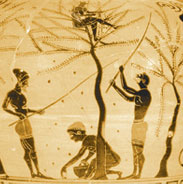 During
prehistory, humankind decided that collecting the fruit of wild
olive trees did not suffice to fulfill its needs, and thus began
the systematic production of the olive crop by initially
domesticating the indigenous, wild tree and subsequently creating
olive groves.
During
prehistory, humankind decided that collecting the fruit of wild
olive trees did not suffice to fulfill its needs, and thus began
the systematic production of the olive crop by initially
domesticating the indigenous, wild tree and subsequently creating
olive groves.
This long-drawn, laborious process is widely held to have begun on Crete. "The honour of having converted the wild olive into cultivated trees belongs to the peasants of Crete," observes French researcher Paul Faure.
It is obvious that the systematic cultivation of the olive greatly contributed to the flourishing of the Minoan Civilization, on whose relics tomes of testimonials to this have come to light throughout the archaeological excavations. In fact, the world's most ancient table olives, dating over 3.500 years, were found in a well in Zakros of Crete. They most likely comprised the libation of a Minoan priest to subterranean deities, who, according to ceremonial practices of the era, "always prefer recesses and caverns of the earth to accommodate such rituals."
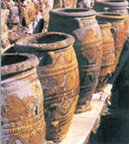 Throughout Hellas (Greece), the olive tree
was considered to be sacred, and as such it is very often depicted
in palace wall murals, shrines, on clay pottery, as well as on
linear A and linear B tablets. Many wreath charms and talismans
representing the olive have also been found. In fact, a tablet was
unearthed in the Minoan city of Knossos, laden with important
ritualistic information regarding quantities of olive oil allocated
to each shrine.
Throughout Hellas (Greece), the olive tree
was considered to be sacred, and as such it is very often depicted
in palace wall murals, shrines, on clay pottery, as well as on
linear A and linear B tablets. Many wreath charms and talismans
representing the olive have also been found. In fact, a tablet was
unearthed in the Minoan city of Knossos, laden with important
ritualistic information regarding quantities of olive oil allocated
to each shrine.
During the Archaic Age, the cultivation of the olive tree begins to thrive, whilst in Athens, which was the financial centre of Hellas proper at the period, the veneration held towards this tree reached the point of it being protected by law, as it was punishable to uproot it or have it cut down.
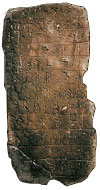 Later on,
the Greeks' quest for arable soil led them to distant lands, where
they founded colonies. Along with their native deities and worship,
they brought to their new homes both the olive tree and their
significant know-how of its cultivation and harvesting. According
to ancient geographer Strabo, this is how the Phocaeans planted the
first olive trees in Massalia (Marseilles) in Gaul (modern France).
The same can be said of Portugal, where, before the settlement of
Greeks, there was no cultivation of the olive, nor any consumption
of olive oil, as the indigenous inhabitants "consumed butter and
smeared their bodies with it."
Later on,
the Greeks' quest for arable soil led them to distant lands, where
they founded colonies. Along with their native deities and worship,
they brought to their new homes both the olive tree and their
significant know-how of its cultivation and harvesting. According
to ancient geographer Strabo, this is how the Phocaeans planted the
first olive trees in Massalia (Marseilles) in Gaul (modern France).
The same can be said of Portugal, where, before the settlement of
Greeks, there was no cultivation of the olive, nor any consumption
of olive oil, as the indigenous inhabitants "consumed butter and
smeared their bodies with it."
The Greeks also used olive oil as a cleaning agent. Athletes in particular, on completion of their training, applied olive oil on their bodies, after which, with the use of a strigil (scraping instrument), they scraped it off along with the dust and sweat that had clung on to it. Furthermore, the fact that the victor's prize of athletic contests was often a large pot filled with olive oil signifies that the athlete had to possess abundant quantities of the product as it was somewhat indispensable to him, especially during periods when the olive trees did not yield a generous crop.
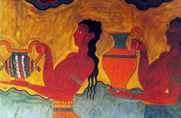 As
regards to its religious character, besides being a symbol of
goddess Athena, the olive tree provided a supply of religious
paraphernalia. Olive branches wielded such symbolic power in that
period that it sufficed for an olive-branch-bearing criminal to
request asylum at a temple, where priests would automatically
provide him with care and shelter. Moreover, olive oil was
considered the holiest and most valuable offering to the gods, as
libations were conducted with it. The historical continuance of
this custom survives to this day in the form of olive oil lanterns
burning in almost all Greek Orthodox Christian homes. Furthermore,
olive oil has always been considered as the most suitable form of
sanctification. In older times, the faithful would anoint an object
with oil to sanctify it; henceforth it would be regarded as
sacred.
As
regards to its religious character, besides being a symbol of
goddess Athena, the olive tree provided a supply of religious
paraphernalia. Olive branches wielded such symbolic power in that
period that it sufficed for an olive-branch-bearing criminal to
request asylum at a temple, where priests would automatically
provide him with care and shelter. Moreover, olive oil was
considered the holiest and most valuable offering to the gods, as
libations were conducted with it. The historical continuance of
this custom survives to this day in the form of olive oil lanterns
burning in almost all Greek Orthodox Christian homes. Furthermore,
olive oil has always been considered as the most suitable form of
sanctification. In older times, the faithful would anoint an object
with oil to sanctify it; henceforth it would be regarded as
sacred.
One of the plights of antiquity, however, was that during any war the first properties to be destroyed by the attackers were the olive groves. As it is known, after being planted, an olive tree requires many years before it can bear crop. This meant that the replanting of the destroyed groves did not offer immediate relief to the families, whose diet largely depended on olive oil. Moreover, the cultivating methods, as well as the extraction process of the product, did not secure steady annual production. For these reasons, families endeavoured to store olive oil quantities greatly exceeding their annual needs.
Roman - Byzantine periods
In Roman Times, the government endeavored to secure distributions of the produced amounts of olive oil throughout the empire. The olive oil trade flourished during Roman times, mainly due to its being transported to areas of the empire that did not enjoy its production. Besides, there was hardly any type of food dish, sauce or sweet adorning the tables of the well-known Roman banquets and feasts without the inclusion of olive oil.
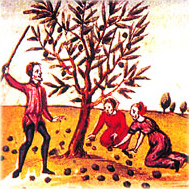 In the Byzantine Period, and particularly in
Constantinople, the capital of the empire, voluminous quantities of
olive oil were consumed, not as much for nutritional and cosmetic
purposes as for the nocturnal lighting of the city, otherwise known
as "the "multi-lighted one". In fact, within the palace itself,
there was a room bearing the name "House of Lights", illuminated
day and night as business transactions took place around the clock
within it. The olive oil demands of the capital were fulfilled by
large monasteries, to which belonged vast acres of olive
groves.
In the Byzantine Period, and particularly in
Constantinople, the capital of the empire, voluminous quantities of
olive oil were consumed, not as much for nutritional and cosmetic
purposes as for the nocturnal lighting of the city, otherwise known
as "the "multi-lighted one". In fact, within the palace itself,
there was a room bearing the name "House of Lights", illuminated
day and night as business transactions took place around the clock
within it. The olive oil demands of the capital were fulfilled by
large monasteries, to which belonged vast acres of olive
groves.
In that same period, in areas that could not accommodate large olive groves and where consequently olive oil production was scant, people had virtually deified the olive tree and the goods it provided them with. They hand-picked the olives from the branches, so that they would not beat the tree; for the latter was considered to be a sacrilegious act. Besides this, it was held that the cultivators of the olive tree had to be as pure and clean as the tree itself. There was a specific purification ritual prior to the harvest, involving abstinence from carnal pleasures, fasting, etc.
The Turkish occupation period
During the Turkish occupation, especially during the 16th century, large quantities of olive oil were exported to European countries, not so much for dietary consumption as for the basic substance used in the soap industry. The most considerable quantity of exported olive oil was sold in Marseilles, which had evolved into a large centre of the soap-producing industry.
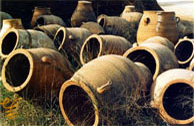 The Greek regions boasting the greatest
production of olive oil were Crete and Peloponnesus. Athens
followed with 200,000 12lt measures and then came Salona with
approximately okkas (unit of measure of 1280 grams). During the
same period, in the more northern regions of Greece where olive oil
was not produced, the price of olive oil was very high and
therefore unaffordable for low-income groups. These people
purchased it in small quantities (one okka per annum) and used it
for pharmaceutical purposes, cooking and as a rubbing agent.
The Greek regions boasting the greatest
production of olive oil were Crete and Peloponnesus. Athens
followed with 200,000 12lt measures and then came Salona with
approximately okkas (unit of measure of 1280 grams). During the
same period, in the more northern regions of Greece where olive oil
was not produced, the price of olive oil was very high and
therefore unaffordable for low-income groups. These people
purchased it in small quantities (one okka per annum) and used it
for pharmaceutical purposes, cooking and as a rubbing agent.
During the first years of the Greek war for independence, the Egyptian governor of Crete, Mohamed Ali, imposed on Cretans cumbersome taxation in general, but his policy on olive oil was characterized as plain robbery. He went on to impound the greater quantity of olive oil production, essentially leaving meager sums to each family. What he collected, he sent to Egypt. In order to gain absolute control of its production on the island, he seized control of all the factories and posted armed soldiers whose orders were to withhold the largest percentage of olive oil, all the kernel oil and even the kernel extract itself!
During the Greek Revolution of 1821 the tactics of the Turkish forces were to exacerbate the already difficult problem of sustenance of the revolutionaries. The most usual method was to set fire to the cultivations of the Greeks. On Crete, in particular, the trees which escaped the torch remained uncultivated, since the requirements of war did not allow for the proper care of the olive groves. Thus the people greatly suffered from the absence of their invaluable crop and oil - a tragic reality when one considers that not only the livelihood, but also the sheer existence of the island's population depended on olive oil.
The olive and olive oil in modern times
Even though western European habits in attire, culture and nutrition were adopted by the Greeks during the last century, what is remarkable is that the sector of olive oil not only resisted this new inclination, but also became the only Greek element that imposed itself on the rest of Europe.
The increasing trend of the Cretan diet, which for obvious politico-economical reasons has been renamed as the Mediterranean diet, began over the past decades and is now gaining rapid ground worldwide, year by year. According to statistics, the consumption of olive oil in Europe, as well as throughout the world, is on a steady increase.
Populations of countries that traditionally consumed animal fat have acknowledged the dietary value of olive oil and over the past few years have been converting their dietary habits. This fact has had positive psychological and economical repercussions on olive-producing countries.


